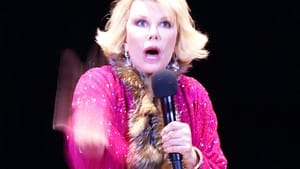Stay in the Loop
BSR publishes on a weekly schedule, with an email newsletter every Wednesday and Thursday morning. There’s no paywall, and subscribing is always free.
What we love to hate about Joan Rivers
Remembering Joan Rivers (one)

Joan Rivers was obscene, vulgar, and cruel. No one escaped her vicious attacks. Not her friend Elizabeth Taylor, her family, or even the Queen of England. For this, we loved her.
When she first appeared on The Tonight Show in 1965, the Civil Rights Act was only one year old and the anti-war movement was simmering on college campuses. The smell of napalm was in the air. In three years, students would shut down Columbia University and the entire city of Paris. In five years, the National Guard would open fire on unarmed students at Kent State, turning previously nonviolent student movements into lethal terrorist organizations. These were revolutionary times. And Rivers’s take-no-prisoners performance was nothing short of revolutionary.
Prior to Rivers, female comedians were daffy (Lucille Ball and Gracie Allen) or buffoons (Fanny Brice and Carol Burnett). None were dangerous, foul-mouthed, or a threat to the status quo. That was left to a legion of “blue” male comedians like Lenny Bruce, Mort Sahl, and Jackie Mason. Rivers was the first to say out loud what we women were thinking. She took the stage by storm and thrilled us by attacking the high and mighty. She ate celebrities for breakfast and spit them out. (On Tom Cruise: "He's been in the closet so long, I'm going to take him to Goodwill.")
Nothing sacred
No one was safe or off-limits. Her husband, Edgar Rosenberg, was the brunt of her jokes for years, even after he committed suicide. A week after the death, she told a British tabloid, “I took my daughter Melissa out to an expensive restaurant and, looking at the menu, I said, if Daddy were alive and he could see these prices, he'd kill himself all over again." We laughed without realizing that Rivers was devastated by her husband’s death and, in losing him, she had lost her best friend and executive producer. That is the function of humor: to heal pain and to break down barriers.
We loved that Rivers was supportive of the LGBT community, and they loved her relentless assault of their celebrity idols, Barbara Streisand and Cher. But who didn’t cringe when Rivers mocked ethnic groups (“Filipinos eat dog!”), called the handicapped “hilarious,” or made fun of the obese? In these PC times, she seemed to be going off the rails. You can’t say that, we thought. But Rivers did. And got away with it. Why? Perhaps because it was just an act. A performance. If the same words had been uttered in any professional setting, it would’ve been grounds for termination or, at least, a course in diversity training.
We loved River’s audacity, her fearless pursuit of truths buried beneath mountains of hypocrisy. No matter where you came down on the Gaza conflict, you have to admire Rivers for having the chutzpah to speak her mind more honestly than most of our legislators. While they hedged their words, Rivers went for the jugular.
Love and hate
If you hated Joan, you were not alone. She hated herself. Although her career took off at the start of the feminist movement, Rivers’s humor was far from liberating. Her attacks on women’s appearance, on their weight, eating habits, and style of dress was mean-spirited — and, in large part, directed at herself. Her negative body image and low self-esteem propelled her to become addicted to cosmetic therapy. You think Michael Jackson had issues? Joan got up every morning, looked in the mirror, and didn’t like what she saw. Her unsparing criticism of Hollywood beauties was nothing compared to her self-loathing, as evidenced by the title of her 2012 memoir, I Hate Everyone . . . Starting with Me.
Somewhere beneath the multiple face-lifts, Botox, fillers, and collagen, Joan Molinsky of Brooklyn never felt she was good enough. Having a degree from Barnard in English Lit and anthropology, and membership in Phi Beta Kappa, didn’t fill the void. Neither did the adoration of her fans or her substantial wealth from a television career that spanned almost 50 years. Nor did owning a $29.5 million penthouse off of Fifth Avenue that resembled the Palace of Versailles. No amount of fabulous furs, designer clothes, or drop-dead jewels could make Rivers feel loved.
Toward the end, Joan Rivers's 81-year-old eyes were the only sign of life behind an immobile mask. And she owned it, constantly making jokes about her surgeries. About her own death, she said, "I want my funeral to be a huge showbiz affair with lights, cameras, action. . . .I want Craft services, I want paparazzi and I want publicists making a scene! I want it to be Hollywood all the way. . . .I want to look gorgeous, better dead than I do alive. I want to be buried in a Valentino gown and I want Harry Winston to make me a toe tag."
Joan got her wish. There is a certain poetic justice to her death at the hands of a surgeon, under anesthesia, knowing no pain or the true indignities of old age. And how can we not love her for that?
For a remembrance by Susan Beth Lehman, click here.
For a remembrance by Thom Nickels, click here.
Sign up for our newsletter
All of the week's new articles, all in one place. Sign up for the free weekly BSR newsletters, and don't miss a conversation.

 Stacia Friedman
Stacia Friedman